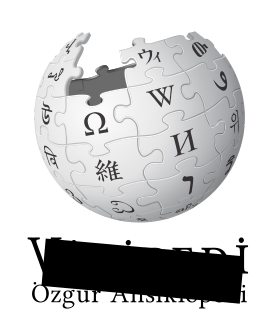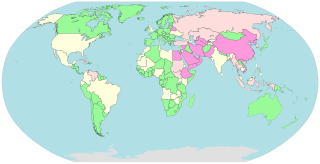Internet censorship in the People's Republic of China (PRC) affects both publishing and viewing online material. Many controversial events are censored from news coverage, preventing many Chinese citizens from knowing about the actions of their government, and severely restricting the freedom of the press. Such measures inspired the policy's nickname, the "Great Firewall of China".

In 2020, Reporters Without Borders ranked Iran 173 out of 180 countries in the World Press Freedom Index. This index lists countries from 1 to 180 based on the level of freedom journalists have to do their job.

Internet censorship in India is done by both central and state governments. DNS filtering and educating service users in suggested usages is an active strategy and government policy to regulate and block access to Internet content on a large scale. Also measures for removing content at the request of content creators through court orders have become more common in recent years. Initiating a mass surveillance government project like Golden Shield Project is also an alternative discussed over the years by government bodies.

Censorship in Turkey is regulated by domestic and international legislation, the latter taking precedence over domestic law, according to Article 90 of the Constitution of Turkey.

Internet censorship is the control or suppression of what can be accessed, published, or viewed on the Internet enacted by regulators, or on their own initiative. Internet censorship puts restrictions on what information can be put on the internet or not. Individuals and organizations may engage in self-censorship for moral, religious, or business reasons, to conform to societal norms, due to intimidation, or out of fear of legal or other consequences.
Most Internet censorship in Thailand prior to the September 2006 military coup d'état was focused on blocking pornographic websites. The following years have seen a constant stream of sometimes violent protests, regional unrest, emergency decrees, a new cybercrimes law, and an updated Internal Security Act. Year by year Internet censorship has grown, with its focus shifting to lèse majesté, national security, and political issues. By 2010, estimates put the number of websites blocked at over 110,000. In December 2011, a dedicated government operation, the Cyber Security Operation Center, was opened. Between its opening and March 2014, the Center told ISPs to block 22,599 URLs.

Iran is one of the countries most strongly identified with internet censorship. As of 2012, an average of 27% of Internet sites were blocked at any given time. As of 2013, almost 50% of the top 500 visited websites worldwide were blocked. The Iranian government and Islamic Revolutionary Guard Sepah also blocked social media such as YouTube, Facebook, Twitter, Blogger, Netflix, Hulu, Telegram, Snapchat, and Medium. Other blocked sites cover a wide range of topics including health, science, sports, news, pornography, and shopping.
The Internet in Egypt is an important part of daily life, as a majority of the population has access to Internet, via smartphones, Internet cafes, or at home. Broadband Internet access via VDSL is widespread. However, Internet censorship and surveillance was severe under the rule of Hosni Mubarak, culminating in a total shutdown of the Internet in Egypt during the 2011 Revolution. Though Internet access was restored following Mubarak's ouster, government censorship and surveillance have increased since the 2013 coup d'état, leading U.S. NGO Freedom House to downgrade Egypt's Internet freedom ranking from "partly free" in 2011 to "not free" in 2015.
The Internet in Turkey has been available to the public since 1993, although experimentation at Ege University started in 1987. The first available connections were dial-up. Cable Internet has been available since 1998 and ADSL since 2001.

Video-sharing platform YouTube is the second-most popular website as of August 2019, according to Alexa Internet. According to the company's press page, YouTube has more than one billion users, and each day, those users watch more than one billion hours of video. Censorship of it has occurred and continues to occur to varying degrees in most countries throughout the world.
An Internet kill switch is a countermeasure concept of activating a single shut off mechanism for all Internet traffic.
Facebook has been replacing traditional media channels since its founding in 2004. Censorship in the media, especially on Facebook, is due to a variety of reasons, since Facebook accepts all kinds of content, with little or no moderation. Because the site indiscriminately displays material posted by users publicly, Facebook effectively can sometimes threaten oppressive governments, while also propelling fake news, hate speech and misinformation, thereby undermining the credibility of online platforms and social media. Many countries have banned or temporarily limited access to the social networking website Facebook, including Mainland China, Iran, Syria, and North Korea. Use of the website has also been restricted in various ways in other countries. As of May 2016, the only countries to ban access around the clock to the social networking site are China, Iran, Syria, and North Korea. However, since most North Korean residents have no access to the Internet, China and Iran are the only countries where access to Facebook is actively restricted in a wholesale manner.
Censorship of Twitter refers to Internet censorship by governments that block access to Twitter, or censorship by Twitter itself. Twitter censorship also includes governmental notice and take down requests to Twitter, which Twitter enforces in accordance with its Terms of Service when a government or authority submits a valid removal request to Twitter indicating that specific content is illegal in their jurisdiction.

Internet censorship in South Korea is strong when compared to other developed countries and contains some unique elements such as the blocking of pro-North Korea websites, which led to it being categorized as "pervasive" in the conflict/security area by OpenNet Initiative. It is also one of the few developed countries that block pornography and material considered harmful to minors as they are illegal by law. It also does not apply to social media websites, which is a common source of legal pornography in South Korea. Any and all material deemed "harmful" or subversive by the state is censored.
There is medium internet censorship in France, including limited filtering of child pornography, laws against websites that promote terrorism or racial hatred, and attempts to protect copyright. The "Freedom on the Net" report by Freedom House has consistently listed France as a country with Internet freedom. Its global ranking was 6 in 2013 and 12 in 2017. A sharp decline in its score, second only to Libya was noted in 2015 and attributed to "problematic policies adopted in the aftermath of the Charlie Hebdo terrorist attack, such as restrictions on content that could be seen as ‘apology for terrorism,’ prosecutions of users, and significantly increased surveillance."
The level of Internet censorship in the Arab Spring was escalated. Lack of Internet freedom was a tactic employed by authorities to quell protests. Rulers and governments across the Arab world utilized the law, technology, and violence to control what was being posted on and disseminated through the Internet. In Egypt, Libya, and Syria, the populations witnessed full Internet shutdowns as their respective governments attempted to quell protests. In Tunisia, the government of Zine El Abidine Ben Ali hacked into and stole passwords from citizens’ Facebook accounts. In Saudi Arabia and Bahrain, bloggers and “netizens” were arrested and some are alleged to have been killed. The developments since the beginning of the Arab Spring in 2010 have raised the issue of Internet access as a human right and have revealed the type of power certain authoritarian governments retain over the people and the Internet.
Internet regulation in Turkey is primarily authorized under the Electronic Communications Law (ECL) and the Internet Act and carried out by the Information and Communication Technologies Authority (ICTA).

Turkey Blocks is an independent digital research organization that monitors internet access restrictions and their relation to political incidents in Turkey. Using its network of monitoring probes, the project has uncovered and documented systematic mass-censorship of communications infrastructure, primarily social media services, during national emergencies and incidents of political significance relating to human rights, freedom of expression and public policy in the region.

From 29 April 2017 to 15 January 2020, the online encyclopedia Wikipedia was blocked in Turkey. On 29 April 2017, Turkish authorities blocked online access to all its language editions throughout the country. The restrictions were imposed by Turkish Law No. 5651, due to the English version's article on state-sponsored terrorism, where Turkey was described as a sponsor country for ISIL and Al-Qaeda, which Turkish courts viewed as a public manipulation of mass media. Requests by the Turkish Information and Communication Technologies Authority to edit several articles to comply with Turkish law were not acted on.

This list of Internet censorship and surveillance in Asia provides information on the types and levels of Internet censorship and surveillance that is occurring in countries in Asia.







